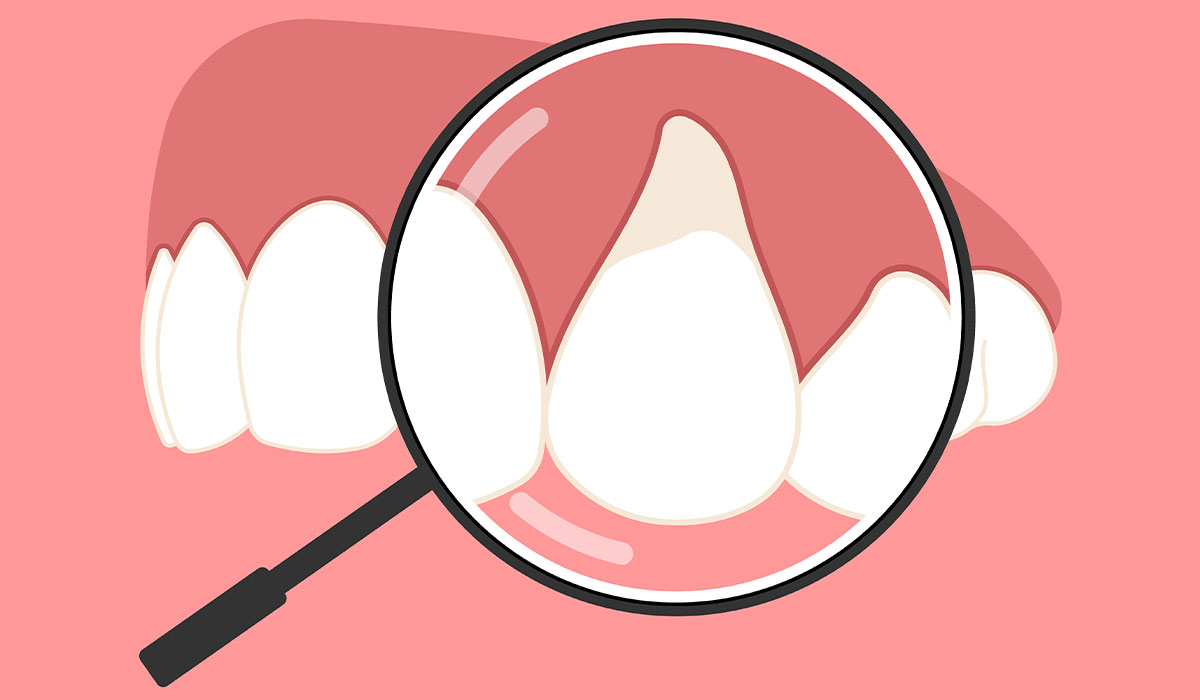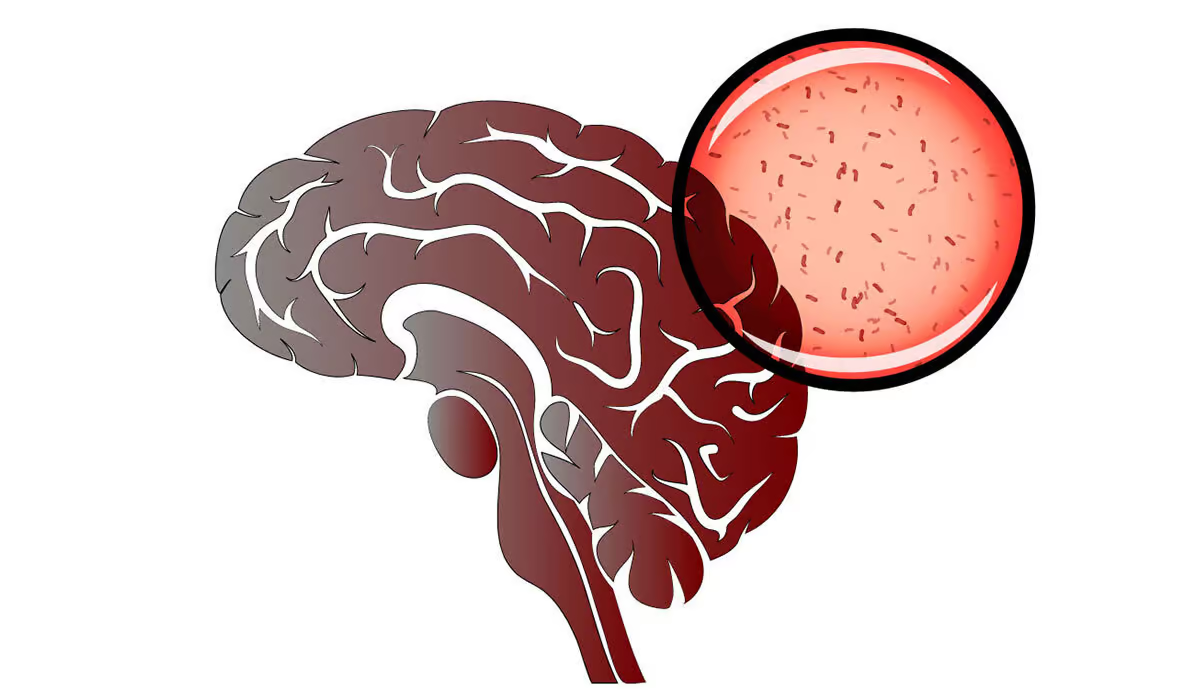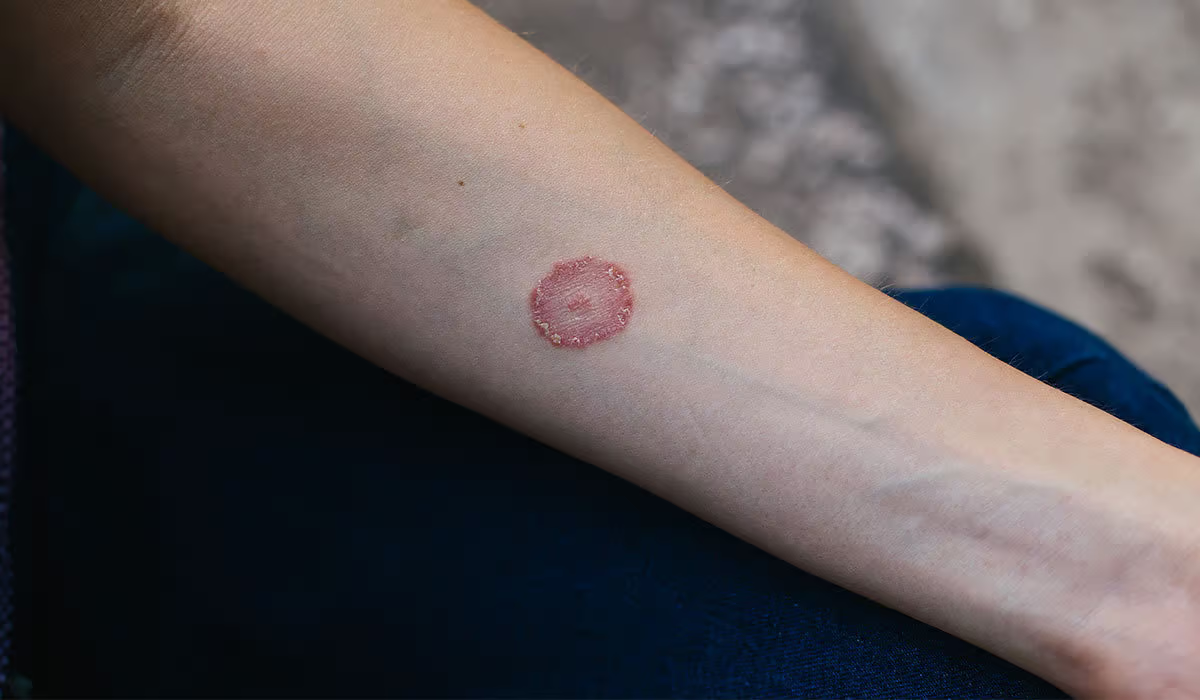Coughing can remove these triggers from your lungs and airways at a speed of up to 15 meters per second.
Inside your throat and airways is a thin layer of mucus coating that protects your airways and cough receptors. If you inhale a trigger, it gets stuck in the mucous of your airways, and your cough receptors recognize it and send an impulse (message) to your brain. After receiving a message that an intruder is present in the airways, your brain sends a message back to the muscles of the chest and abdomen to rapidly take a breath in and out to remove the trigger. The air moves very fast during coughing, which enables the removal of an intruder.
An occasional cough is normal and proves you have a healthy defense reflex. However, if it persists and doesn’t go away for up to 8 weeks, you should consult your doctor.
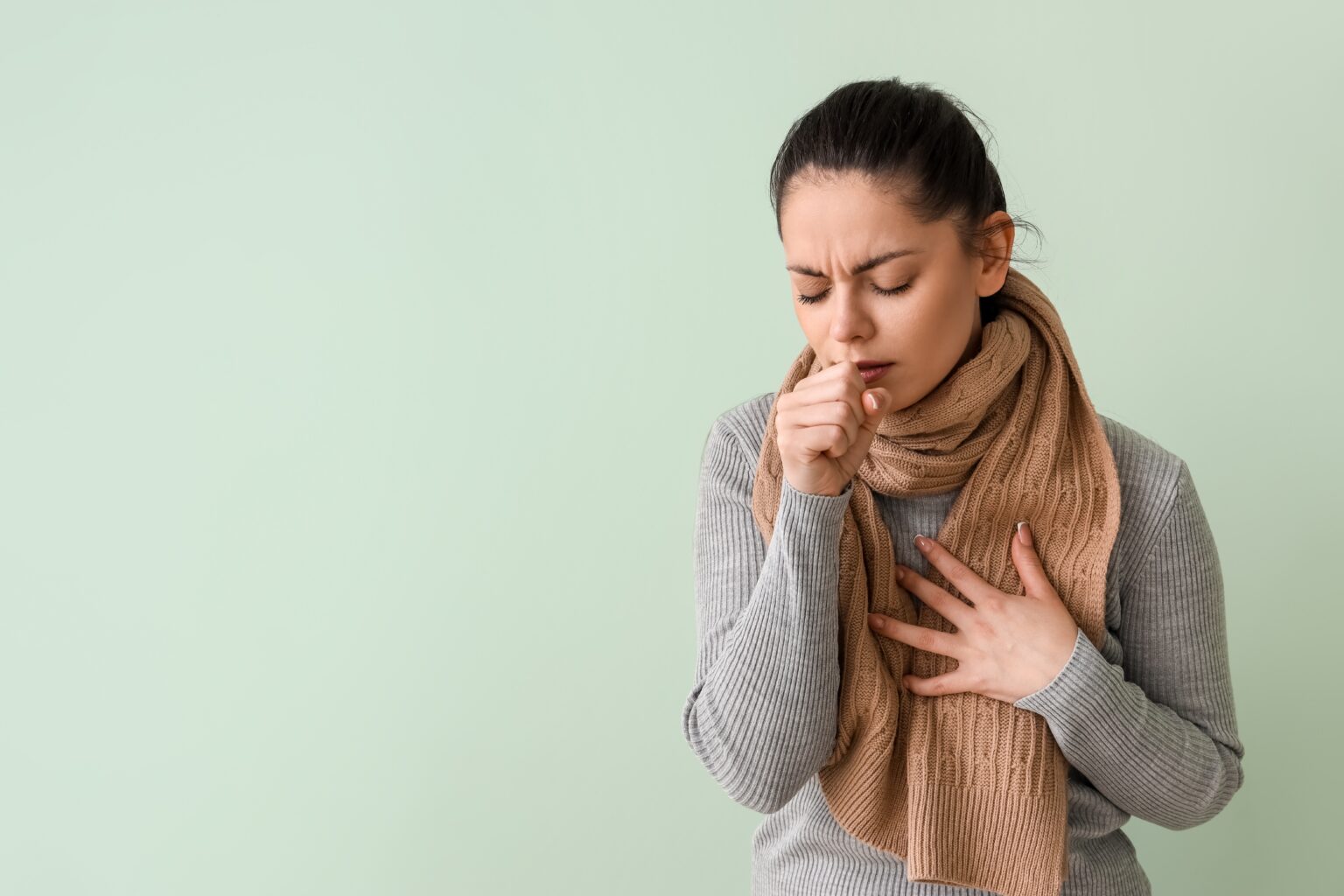
Types
There are several types of cough. Certain sicknesses have special kinds that only show up with them, like croup. This special cough helps doctors diagnose the sickness quickly. Coughs can be told apart by how long they last and their sound or feel.
Based on how long the symptoms stick around, coughs are put into categories:
- Acute (goes away in less than three weeks)
- Subacute (stays more than three weeks but less than eight weeks)
- Chronic (lasts more than eight weeks).
Depending on whether mucus or phlegm is coughed up, the cough is divided into:
- Non-productive, also called dry – without expectoration of phlegm or mucous
- Productive, also called wet – involves spitting out phlegm or mucous
Doctors also extinguish different types of the condition based on their sounds. Those types are usually specific to particular conditions or groups of conditions. The specific types of this symptom based on the sound the patient is making include:
- Barking—This type appears during croup, an airway inflammation mainly affecting babies and young children. It is dry and resembles a seal’s bark.
- Wheezing—Wheezing happens when air passes obstructed airways during coughing. It is a high-pitched sound often associated with chronic conditions such as asthma.
- Whooping, also called pertussis, is a contagious condition in which a violent cough is preceded by a deep inhale of air that sounds like a “whoop.”
Causes
Many different reasons can cause cough. The most common ones include:
- Smoking or vaping – substances contained in cigarettes or vaping irritate the lining of the respiratory tract, resulting in unpleasant symptoms
- Dust
- Pollens
- Mold
- Pet dander
- Some medications, such as ACE inhibitors, a blood pressure medication
Certain medical conditions can trigger an acute or chronic cough. Those include:
- Asthma
- Flu
- COVID-19
- RSV (Respiratory syncytial virus)
- Pertussis
- Bronchitis
- Tuberculosis
- GERD
- Chronic obstructive pulmonary disease (COPD)
- Postnasal drip
- Heart failure
GERD
Gastrointestinal reflux disease (GERD) is one of the most frequently diagnosed digestive system conditions. The detailed mechanism of its development remains unexplained. It is assumed that reduced muscle tension of the lower esophageal sphincter plays an important role. Heartburn is a typical reflux symptom, but it is not the only symptom.
People with GERD may also experience chest pain, digestive problems, and several symptoms unrelated to the esophagus, such as cough. Cough associated with GERD occurs when acidic stomach contents flow to the respiratory tract and irritate the respiratory system, triggering the symptoms.
Treating the GERD-related cough involves treating the reflux with GERD medications and lifestyle changes, such as sleeping with an elevated head. These can prevent respiratory tract irritation and, therefore, troublesome symptoms.
Asthma
Asthma is a disease that affects the bronchi. Contraction of the muscles in the bronchial walls causes their narrowing during an asthma attack. Compared to healthy people, the bronchi in people with asthma constrict too quickly and too much.
Cough is one of the primary symptoms of an asthma attack. This symptom appears both day and night, making rest and sleep difficult. Shortness of breath and a feeling of tightness or heaviness in the chest also appear in asthmatic cough.
During an asthma attack, wheezing occurs, and the patient gasps for air with difficulty. There are also speaking problems, and the heart rate increases significantly. In case of severe symptoms and a troublesome attack of asthmatic cough, sweating may also occur, as well as pale skin and bluish lips.
In some patients, cough is the only symptom of asthma. Remember, however, that not every chronic cough is an asthma symptom. Distinguishing the diseases that cause this symptom is not easy. If it persists chronically, it is necessary to see a doctor who can order appropriate diagnostics based on the symptoms.
Postnasal Drip
A postnasal drip is an unpleasant condition in which excess or thick mucous from the nose is naturally transported toward the throat, and you begin to feel it. As a result, you feel an unpleasant sensation of constant obstruction, blockage, hoarseness, wheezing, and the need to spit out. When the mucous runs down the throat, it enters the lower respiratory tract and triggers a cough. This prolonged condition may predispose to infection.
Therefore, if you experience postnasal drip, consult your physician about possible solutions.
Croup
Croup is a mild inflammation of the respiratory tract in children. Viruses damage the mucous membrane of the subglottic area of the larynx, swelling and narrowing the airway lumen. Shortness of breath, difficulty inhaling air into the lungs, and a characteristic inspiratory wheeze called stridor occur. As in most upper respiratory tract viral infections, croup spreads through droplets.
A characteristic symptom of croup is a barking cough that resembles the barking of a dog or seal. It allows doctors to recognize the disease and initiate treatment quickly.
Chronic obstructive pulmonary disease (COPD)
Chronic obstructive pulmonary disease (COPD) is a common disease characterized by permanent limitation of airflow through the respiratory tract, which usually progresses and is associated with severe chronic inflammation of the respiratory tract and lungs due to harmful particles, e.g., contained in tobacco smoke.
Spirometry is the primary test for diagnosing and assessing the progression of COPD. It allows doctors to assess the degree of narrowing (obstruction) of the respiratory tract and determine whether it is reversible or irreversible.
Cough is usually the first symptom of COPD. In COPD patients, it is chronic, lasts for a long time, and is often accompanied by coughing up mucous (mainly after an attack).
Allergies
An allergic cough is an allergic reaction that occurs in the respiratory system. If you have allergies and come into contact with an allergenic molecule (allergen), reactions taking place in the mucous membrane of the respiratory tract may cause this symptom. This is a specific defense of the body after contact with an allergen.
Risk Factors
Some people are at a higher risk of experiencing this symptom due to their medical conditions, occupation, or lifestyle habits. The risk factors include:
- Smoking
- Having GERD (Gastroesophageal reflux disease)
- Taking certain medications, e.g., drugs for high pressure
- Vaping
- Having allergies
- Being a child – young children tend to catch infections more often than adults.
Additional Symptoms
Cough is a symptom rather than a condition. However, when experiencing it, you can have additional symptoms. The presence of these additional symptoms may help find the cause. For example, if you experience a dry cough, sore throat, fatigue, and runny nose, the infection is probably the cause. When difficulty breathing accompanies wheezing, doctors will suspect asthma as a likely cause.
The additional symptoms may include:
- Shortness of breath
- Fever
- Fatigue, runny nose, and sore throat
- Loss of taste or smell
- Night sweats
- Scratchy throat
- Hoarseness
- Heartburn
- Postnasal drip, which is a feeling of mucous running down your throat
- Coughing up blood

Diagnosis
Taking a medical history is the first step your doctor will take. The questions you can expect include:
- When did the symptoms start?
- Does it get worse?
- Does it bring up mucus? What is its consistency and color?
- Do you have any additional symptoms?
- Do you have any allergies?
- Do you smoke?
- What medications do you take?
After that, your physician will likely put a stethoscope on your chest to listen to your lungs’ sounds while breathing. The sounds heard during the examination are different for different coughs and conditions, which helps the physician diagnose. The doctor assesses whether the sound is low or high-pitched, its loudness, duration, and how fast you breathe.
In some cases, to diagnose, your physician might order additional tests, such as chest X-ray, CT, blood tests, mucus tests, or spirometry.
Treatment
After making a diagnosis, your physician will prescribe medications or recommend some home remedies depending on the cause of your symptoms. If possible, the cause of the symptoms should be eliminated. For example, if your symptoms are caused by smoking, you should stop for respiratory system inflammation to get better. If GERD causes it, it should be treated by diet changes and some medications, e.g., PPIs or H2-blockers.
Cough medicine (suppressants) is recommended for dry, severe coughs. They should not be used for wet (productive) coughs as they prevent the mucous from being expectorated from the respiratory tract. It’s important to remember that some medications are a component of flu medications and not overdose by accident.
For the wet (productive) type, you shouldn’t stop the symptoms because it is a beneficial reflex -it allows the clearing of the respiratory tract. If the mucous is too thick, medicines that increase expectoration and thin out mucus (mucolytics) may be helpful.
If the cough does not go away and is accompanied by other symptoms of infection, such as fever, you should see a doctor. Sometimes, it is necessary to prescribe an antibiotic or anti-viral drug to destroy the bacteria or viruses growing in the mucus.
If it occurs during pregnancy, it requires special treatment, as most cough medications are contraindicated in pregnant women. It should then be treated with home remedies and drugs that the doctor specifically orders.

Home Remedies
People often use home treatments to ease coughs, especially when they catch a cold. Honey can help kids who cough because of a cold. Giving them honey at night may make their cough better. Honey is generally safe and might even fight germs. But don’t give honey to babies under one year old!
When the air indoors is dry and warm, coughs can worsen and wear you out. So, adding moisture to the air at your place is a good idea. A humidifier, especially in dry winter, can help a lot. Not drinking enough water when you’re sick can make things rougher. So, it’s important to drink plenty of fluids to avoid getting dehydrated, which can make your symptoms worse.
Other ways to feel better at home include drinking herbal teas, gargling with salt water, and adding ginger to the tea.
Prevention
Coughing is a natural way your body gets rid of things that bother it, like dust or germs. But if it’s really bad or goes on for a long time, it can be a problem. In some cases, you can stop this by avoiding things that make you cough so they don’t get into your breathing tubes. Those measures of prevention include:
- Stop smoking
- Avoiding large gatherings
- Avoid people with visible flu-like symptoms
- Get vaccinated against pneumonia and COVID-19
- Wash your hands often and use hand sanitizers
- Avoid touching your mouth and eyes
- If you have allergies, avoid things that trigger your allergy symptoms
- If you have heartburn often, consult your doctor about GERD medications
- If your child often experiences infections, talk to your doctor about possible vaccinations that can help prevent it
- Use a humidifier to keep the air at your home moist
Complications
Cough rarely causes complications. These include fainting, pneumothorax (leakage of air from the lung into the pleural cavity due to rupture of the lung), rib fractures (generally in people with pathological changes in the ribs, e.g., osteoporosis or bone cancer), damage to chest muscles and nerves.
When Should You See a Doctor?
Generally, a cough is not something to be worried about since it is a sign of a mild infection. However, if it is particularly severe or accompanied by troubling symptoms, such as breathing difficulties, high fever that doesn’t get better after medications, loss of smell or taste, or bleeding from the airways, you should contact your physician.
If your symptoms persist for more than eight weeks, they are considered chronic, and you should consult a professional even if they are mild.
Sources
- Kwon SB, Park J, Jang J, Cho Y, Park DS, Kim C, Bae GN, Jang A. Study on the initial velocity distribution of exhaled air from coughing and speaking. Chemosphere. 2012 Jun;87(11):1260-4. doi: 10.1016/j.chemosphere.2012.01.032. Epub 2012 Feb 18. PMID: 22342283; PMCID: PMC7112028. https://www.ncbi.nlm.nih.gov/pmc/articles/PMC7112028/
- American Lung Association Learn About Cough (2024) https://www.lung.org/lung-health-diseases/warning-signs-of-lung-disease/cough/learn-about-cough
- Amos LB. Cough. Nelson Pediatric Symptom-Based Diagnosis. 2018:15–38.e1. doi: 10.1016/B978-0-323-39956-2.00002-9. Epub 2017 May 12. PMCID: PMC7152259. https://www.ncbi.nlm.nih.gov/pmc/articles/PMC7152259/
- Fan Q, Pan F, Yang L. Spontaneous pneumothorax and subpleural bullae in a patient with COVID-19: a 92-day observation. Eur J Cardiothorac Surg. 2020 Oct 1;58(4):858-860. doi: 10.1093/ejcts/ezaa305. PMID: 32951046; PMCID: PMC7543338. https://www.ncbi.nlm.nih.gov/pmc/articles/PMC7543338/
- Centers for Disease Control and Prevention Coughing and Sneezing (2023) https://www.cdc.gov/hygiene/personal-hygiene/coughing-sneezing.html
- Madanick RD. Management of GERD-Related Chronic Cough. Gastroenterol Hepatol (N Y). 2013 May;9(5):311-3. PMID: 23943667; PMCID: PMC3740808. https://www.ncbi.nlm.nih.gov/pmc/articles/PMC3740808/
- American College of Allergy, Asthma & Immunology (ACAAI) Asthma https://acaai.org/asthma/symptoms/asthma-cough/
- Harvard Health Publishing Treatments for post-nasal drip (2022) https://www.health.harvard.edu/staying-healthy/treatments-for-post-nasal-drip
- National Health Service (NHS) Croup (2023) https://www.nhs.uk/conditions/croup/
- American Lung Association Diagnosing and Treating (2022) https://www.lung.org/lung-health-diseases/warning-signs-of-lung-disease/cough/diagnosing-treating



